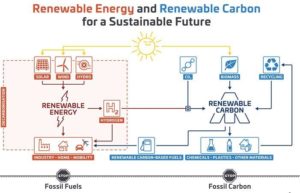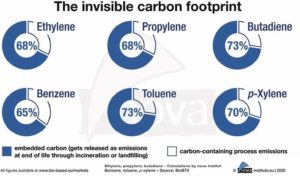Bildnachweis: NicoElNino – stock.adobe.com, nova-Institut.
The climate crisis is accelerating at an unprecedented pace, with global warming, greenhouse gas emissions and deforestation leading to food insecurity, global health problems and biodiversity loss. Greenhouse gas emissions associated with the use of carbon-containing fossil energy sources such as oil, coal and natural gas have been shown to be a major contributor to climate change. Thus, for decades the focus of climate protection has been predominantly on the energy sector. A new initiative is now expanding this view. By Michael Carus
In December 2020, the Bioenergy International Journal pointed out that the International Energy Agency (IEA) recently highlighted “blind spots” of the global petroleum system. The journal emphasised the importance of petrochemicals – their prevalence in everyday products and their relevance to the manufacture of many parts of the modern energy system. The crux: the more we extract from under the ground, the more we add to the problems above ground. The solution to this problem: renewable carbon, which encompasses all carbon sources that avoid or substitute the use of any additional fossil carbon from the geosphere. Renewable carbon can come from the biosphere, the atmosphere or the technosphere – but not from the geosphere. Renewable carbon circulates between the biosphere, the atmosphere and the technosphere, creating a carbon circular economy.

The recently established Renewable Carbon Initiative (RCI) builds on this solution. A more holistic approach towards climate protection, it incorporates embedded carbon in chemicals and derived materials. The initiative has been well-received by the chemical and materials industry as well as outside this industrial sector.
The Renewable Carbon Initiative (RCI)
The Renewable Carbon Initiative (RCI) was initiated by nova-Institute after observing the struggles of the chemical and plastics industry; these industries face enormous challenges in meeting both the climate goals set by the European Union and the sustainability expectations of societies around the globe. It was clear that the industry must go beyond using renewable energy and also consider the raw materials they use. Decarbonisation of these materials is not an option for organic chemistry since it is entirely based on the use of carbon; thus an alternative strategy was needed. To explore alternatives, the nova-Institute developed a renewable carbon strategy and set up the RCI to bring theory to life.
Eleven leading companies from six countries founded the RCI on 23 September 2020 under the leadership of the nova-Institute. One year later, the RCI already has 30 members, six partners and more than 200 individual supporters. The initiative aims to support and speed up the transition from fossil carbon to renewable carbon for all organic chemicals and materials.

The RCI addresses the core problem of climate change, which is largely related to extracting and using additional fossil carbon from the ground. The vision is clear: by 2050, fossil carbon should be completely substituted by renewable carbon, which is carbon from alternative sources such as biomass, direct CO2 utilisation and recycling. The founders are convinced that this is the only way for chemicals, plastics and other derived products to become more sustainable, more climate-friendly, part of the circular economy – and thus part of the future.
The RCI urges the industry to go beyond simply using renewable energy and to face the fact that ALL fossil carbon use must end: the carbon contained in the molecules of organic chemicals and materials is also prone to end up in the atmosphere sooner or later. Only a full phase-out of fossil carbon will help to prevent a further increase in the concentration of CO2. Consequently, companies are encouraged to focus on phasing out fossil resources and to use renewable carbon instead. This is about a fundamental change in the chemical industry. Just as the energy industry is being converted to renewable energies, so renewable carbon will become the new foundation of the future chemical and material industry.
The renewable carbon strategy
For the first time since the Industrial Revolution, technology allows us to decouple chemical, plastics, fibre and other material industries from the use of fossil carbon. The last few decades have given rise to multiple technological pathways to completely replace fossil carbon with sources of renewable carbon: biomass, direct CO2 utilisation (from industrial flue gases or the atmosphere), and mechanical and chemical recycling. The renewable carbon strategy unites these sources and provides companies with a framework for future investments by creating sufficient room for them to operate. It also provides a strategic direction for the reduction of fossil carbon dependency so that fossil carbon utilisation can ultimately be eliminated altogether. This material transformation is driven by a diverse mix of international brands and start-ups that are initiated and headed by the German nova-Institute.
The RCI aims at fostering networks among its members and building new value chains to replace fossil carbon with renewable carbon from biomass, CO2 utilisation and recycling. Since its launch, the initiative has been busy raising awareness and reaching out to industry, politics and the public. Besides creating a website with comprehensive information and marketing-related press releases, the RCI regularly holds public webinars to address questions surrounding renewable carbon. Video clips introducing each member of the RCI and their motivation are available on the RCI YouTube channel, and a comic strip has been released as a playful option for sharing and understanding the renewable carbon concept.
To bring networking among RCI members to the next level, the Renewable Carbon Community will be launched in autumn 2021. This online platform is intended to become the heart of RCI collaboration and discussions. A growing number of working partnerships have already been established with other stakeholder organisations like CO2 Value Europe, Textile Exchange, the European Circular Bioeconomy Fund (ECBF) and WWF Germany. The RCI also organises supporting events such as the Renewable Materials Conference. Further joint activities are under development.
In summary, the RCI’s activities reflect the needs of its members. The initiative raises awareness of renewable carbon and promotes strategy; it provides background data and information on the concept and its potential impact; it affords networking opportunities; and it facilitates the building of new value chains to replace fossil carbon with biomass, direct CO2 utilisation and recycling.
ABOUT THE AUTHOR
Michael Carus is founder and CEO of the nova-Institut GmbH.


